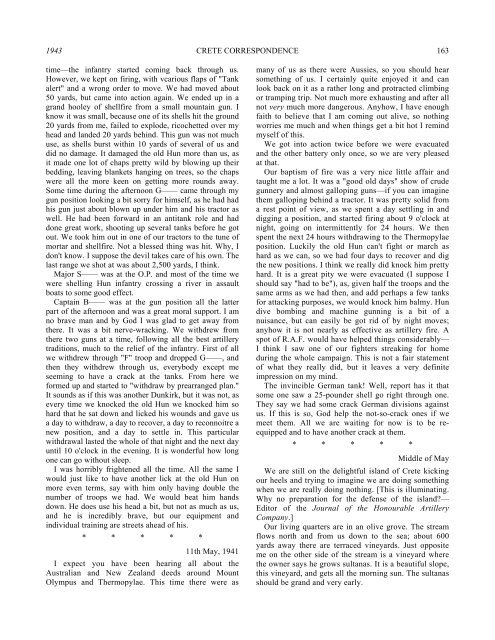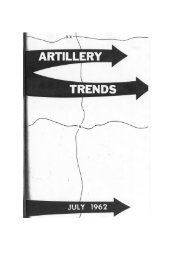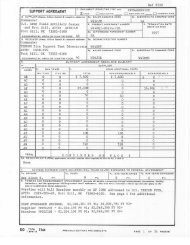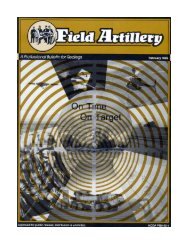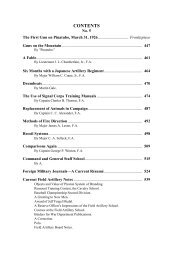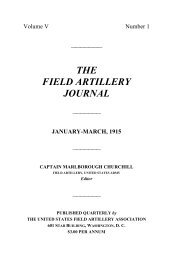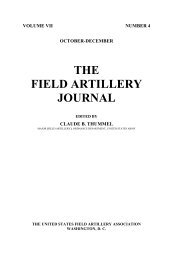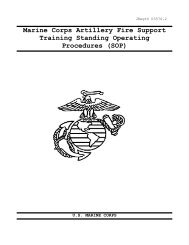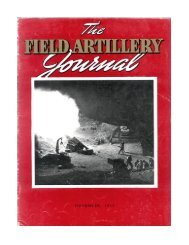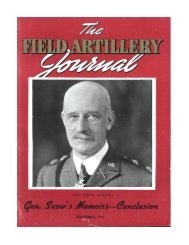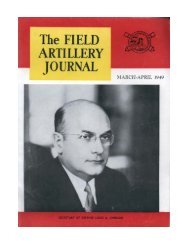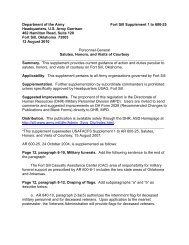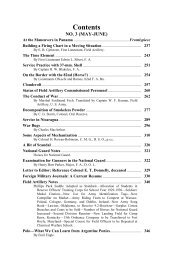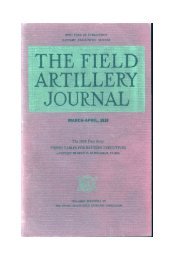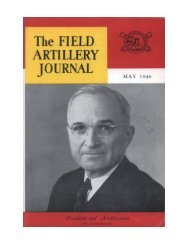the field artillery journal - Fort Sill - U.S. Army
the field artillery journal - Fort Sill - U.S. Army
the field artillery journal - Fort Sill - U.S. Army
You also want an ePaper? Increase the reach of your titles
YUMPU automatically turns print PDFs into web optimized ePapers that Google loves.
1943 CRETE CORRESPONDENCE 163<br />
time—<strong>the</strong> infantry started coming back through us.<br />
However, we kept on firing, with vcarious flaps of "Tank<br />
alert" and a wrong order to move. We had moved about<br />
50 yards, but came into action again. We ended up in a<br />
grand hooley of shellfire from a small mountain gun. I<br />
know it was small, because one of its shells hit <strong>the</strong> ground<br />
20 yards from me, failed to explode, ricochetted over my<br />
head and landed 20 yards behind. This gun was not much<br />
use, as shells burst within 10 yards of several of us and<br />
did no damage. It damaged <strong>the</strong> old Hun more than us, as<br />
it made one lot of chaps pretty wild by blowing up <strong>the</strong>ir<br />
bedding, leaving blankets hanging on trees, so <strong>the</strong> chaps<br />
were all <strong>the</strong> more keen on getting more rounds away.<br />
Some time during <strong>the</strong> afternoon G—— came through my<br />
gun position looking a bit sorry for himself, as he had had<br />
his gun just about blown up under him and his tractor as<br />
well. He had been forward in an antitank role and had<br />
done great work, shooting up several tanks before he got<br />
out. We took him out in one of our tractors to <strong>the</strong> tune of<br />
mortar and shellfire. Not a blessed thing was hit. Why, I<br />
don't know. I suppose <strong>the</strong> devil takes care of his own. The<br />
last range we shot at was about 2,500 yards, I think.<br />
Major S—— was at <strong>the</strong> O.P. and most of <strong>the</strong> time we<br />
were shelling Hun infantry crossing a river in assault<br />
boats to some good effect.<br />
Captain B—— was at <strong>the</strong> gun position all <strong>the</strong> latter<br />
part of <strong>the</strong> afternoon and was a great moral support. I am<br />
no brave man and by God I was glad to get away from<br />
<strong>the</strong>re. It was a bit nerve-wracking. We withdrew from<br />
<strong>the</strong>re two guns at a time, following all <strong>the</strong> best <strong>artillery</strong><br />
traditions, much to <strong>the</strong> relief of <strong>the</strong> infantry. First of all<br />
we withdrew through "F" troop and dropped G——, and<br />
<strong>the</strong>n <strong>the</strong>y withdrew through us, everybody except me<br />
seeming to have a crack at <strong>the</strong> tanks. From here we<br />
formed up and started to "withdraw by prearranged plan."<br />
It sounds as if this was ano<strong>the</strong>r Dunkirk, but it was not, as<br />
every time we knocked <strong>the</strong> old Hun we knocked him so<br />
hard that he sat down and licked his wounds and gave us<br />
a day to withdraw, a day to recover, a day to reconnoitre a<br />
new position, and a day to settle in. This particular<br />
withdrawal lasted <strong>the</strong> whole of that night and <strong>the</strong> next day<br />
until 10 o'clock in <strong>the</strong> evening. It is wonderful how long<br />
one can go without sleep.<br />
I was horribly frightened all <strong>the</strong> time. All <strong>the</strong> same I<br />
would just like to have ano<strong>the</strong>r lick at <strong>the</strong> old Hun on<br />
more even terms, say with him only having double <strong>the</strong><br />
number of troops we had. We would beat him hands<br />
down. He does use his head a bit, but not as much as us,<br />
and he is incredibly brave, but our equipment and<br />
individual training are streets ahead of his.<br />
* * * * *<br />
11th May, 1941<br />
I expect you have been hearing all about <strong>the</strong><br />
Australian and New Zealand deeds around Mount<br />
Olympus and Thermopylae. This time <strong>the</strong>re were as<br />
many of us as <strong>the</strong>re were Aussies, so you should hear<br />
something of us. I certainly quite enjoyed it and can<br />
look back on it as a ra<strong>the</strong>r long and protracted climbing<br />
or tramping trip. Not much more exhausting and after all<br />
not very much more dangerous. Anyhow, I have enough<br />
faith to believe that I am coming out alive, so nothing<br />
worries me much and when things get a bit hot I remind<br />
myself of this.<br />
We got into action twice before we were evacuated<br />
and <strong>the</strong> o<strong>the</strong>r battery only once, so we are very pleased<br />
at that.<br />
Our baptism of fire was a very nice little affair and<br />
taught me a lot. It was a "good old days" show of crude<br />
gunnery and almost galloping guns—if you can imagine<br />
<strong>the</strong>m galloping behind a tractor. It was pretty solid from<br />
a rest point of view, as we spent a day settling in and<br />
digging a position, and started firing about 9 o'clock at<br />
night, going on intermittently for 24 hours. We <strong>the</strong>n<br />
spent <strong>the</strong> next 24 hours withdrawing to <strong>the</strong> Thermopylae<br />
position. Luckily <strong>the</strong> old Hun can't fight or march as<br />
hard as we can, so we had four days to recover and dig<br />
<strong>the</strong> new positions. I think we really did knock him pretty<br />
hard. It is a great pity we were evacuated (I suppose I<br />
should say "had to be"), as, given half <strong>the</strong> troops and <strong>the</strong><br />
same arms as we had <strong>the</strong>n, and add perhaps a few tanks<br />
for attacking purposes, we would knock him balmy. Hun<br />
dive bombing and machine gunning is a bit of a<br />
nuisance, but can easily be got rid of by night moves;<br />
anyhow it is not nearly as effective as <strong>artillery</strong> fire. A<br />
spot of R.A.F. would have helped things considerably—<br />
I think I saw one of our fighters streaking for home<br />
during <strong>the</strong> whole campaign. This is not a fair statement<br />
of what <strong>the</strong>y really did, but it leaves a very definite<br />
impression on my mind.<br />
The invincible German tank! Well, report has it that<br />
some one saw a 25-pounder shell go right through one.<br />
They say we had some crack German divisions against<br />
us. If this is so, God help <strong>the</strong> not-so-crack ones if we<br />
meet <strong>the</strong>m. All we are waiting for now is to be reequipped<br />
and to have ano<strong>the</strong>r crack at <strong>the</strong>m.<br />
* * * * *<br />
Middle of May<br />
We are still on <strong>the</strong> delightful island of Crete kicking<br />
our heels and trying to imagine we are doing something<br />
when we are really doing nothing. [This is illuminating.<br />
Why no preparation for <strong>the</strong> defense of <strong>the</strong> island?—<br />
Editor of <strong>the</strong> Journal of <strong>the</strong> Honourable Artillery<br />
Company.]<br />
Our living quarters are in an olive grove. The stream<br />
flows north and from us down to <strong>the</strong> sea; about 600<br />
yards away <strong>the</strong>re are terraced vineyards. Just opposite<br />
me on <strong>the</strong> o<strong>the</strong>r side of <strong>the</strong> stream is a vineyard where<br />
<strong>the</strong> owner says he grows sultanas. It is a beautiful slope,<br />
this vineyard, and gets all <strong>the</strong> morning sun. The sultanas<br />
should be grand and very early.


